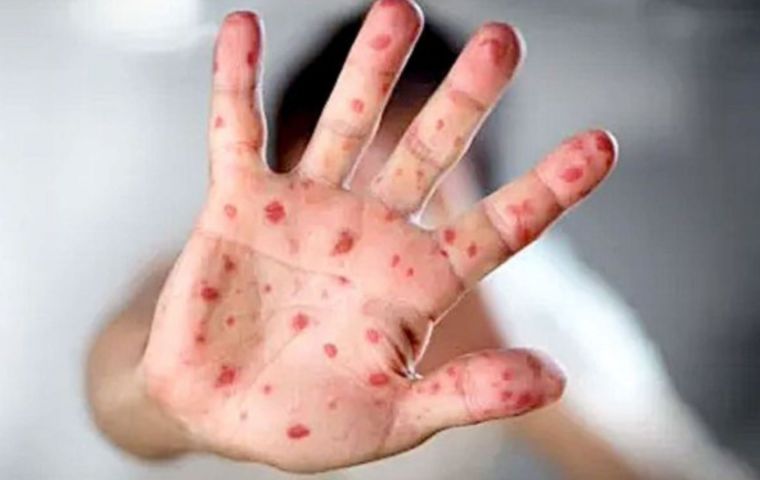MercoPress. South Atlantic News Agency
Monkeypox cases soar in Colombia
 Colombia largely surpasses the number of infections in Argentina and Uruguay
Colombia largely surpasses the number of infections in Argentina and Uruguay Colombian health authorities Monday confirmed 938 people had been diagnosed with monkeypox nationwide, with the bulk of the cases being in Bogotá.
The National Health Institute (INS) reported that the new infections had been detected after analyzing 1,461 suspected cases since June, a process in which 523 suspected cases were ruled out.
According to the INS, there were 697 cases in Bogotá and 125 in Antioquia, and 21 others in Cundinamarca, while 208 patients have been discharged from the hospital.
Meanwhile, there were 170 cases of the malady confirmed in Argentina, all of them focused in 7 of the 24 provinces (including the Autonomous City of Buenos Aires - CABA).
Until August 31, 40 cases had been reported in the province of Buenos Aires, 118 in CABA, 5 in Córdoba, 1 in Mendoza, 1 in Neuquén, 2 in Río Negro, and 3 in Santa Fe.
Of the total number of infected patients, only 41 had a travel history prior to the onset of symptoms: 26 from Europe, 8 from North America, 6 from South America, and one unspecified trip.
Of the confirmed cases, 99.41% were legal males aged between 18 and 61 years. Most infections occurred among men who have sex with men (90 out of 170 people acknowledged that circumstance). However, health officials insisted the malady “can affect anyone.”
Most of the cases in Argentina presented mild symptoms with a skin rash and in several cases a few lesions in different places such as genitals, perianal, hands, torso, and face. No serious cases, hospitalizations, or deaths have been reported.
On the other hand, Uruguay's Health Undersecretary José Luis Satdjian confirmed Tuesday that the country had recorded its fifth bout of monkeypox, which was not related to the other four.“
Satdjian also explained that all those infected were ”in good health, at home,” with only two cases remaining currently active. The official also admitted the authorities were monitoring the patients' close contacts to avoid a mass spread of the disease.
He also explained there was still no date for the delivery of vaccines against monkeypox purchased from foreign laboratories. Satdjian also pointed out conversations were going on with the Pan American Health Organization (PAHO) in this regard.




Top Comments
Disclaimer & comment rulesCommenting for this story is now closed.
If you have a Facebook account, become a fan and comment on our Facebook Page!